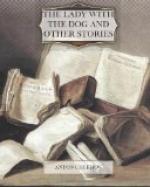Her trembling infected him, too. He glanced once more at the arm-chair, which was now empty, felt a sudden weakness in his arms and legs, was frightened, and began dressing.
“It’s nothing, Tanya; it’s nothing,” he muttered, shivering. “I really am not quite well . . . it’s time to admit that.”
“I have noticed it for a long time . . . and father has noticed it,” she said, trying to suppress her sobs. “You talk to yourself, smile somehow strangely . . . and can’t sleep. Oh, my God, my God, save us!” she said in terror. “But don’t be frightened, Andryusha; for God’s sake don’t be frightened. . . .”
She began dressing, too. Only now, looking at her, Kovrin realised the danger of his position—realised the meaning of the black monk and his conversations with him. It was clear to him now that he was mad.
Neither of them knew why they dressed and went into the dining-room: she in front and he following her. There they found Yegor Semyonitch standing in his dressing-gown and with a candle in his hand. He was staying with them, and had been awakened by Tanya’s sobs.
“Don’t be frightened, Andryusha,” Tanya was saying, shivering as though in a fever; “don’t be frightened. . . . Father, it will all pass over . . . it will all pass over. . . .”
Kovrin was too much agitated to speak. He wanted to say to his father-in-law in a playful tone: “Congratulate me; it appears I have gone out of my mind”; but he could only move his lips and smile bitterly.
At nine o’clock in the morning they put on his jacket and fur coat, wrapped him up in a shawl, and took him in a carriage to a doctor.
VIII
Summer had come again, and the doctor advised their going into the country. Kovrin had recovered; he had left off seeing the black monk, and he had only to get up his strength. Staying at his father-in-law’s, he drank a great deal of milk, worked for only two hours out of the twenty-four, and neither smoked nor drank wine.
On the evening before Elijah’s Day they had an evening service in the house. When the deacon was handing the priest the censer the immense old room smelt like a graveyard, and Kovrin felt bored. He went out into the garden. Without noticing the gorgeous flowers, he walked about the garden, sat down on a seat, then strolled about the park; reaching the river, he went down and then stood lost in thought, looking at the water. The sullen pines with their shaggy roots, which had seen him a year before so young, so joyful and confident, were not whispering now, but standing mute and motionless, as though they did not recognise him. And, indeed, his head was closely cropped, his beautiful long hair was gone, his step was lagging, his face was fuller and paler than last summer.
He crossed by the footbridge to the other side. Where the year before there had been rye the oats stood, reaped, and lay in rows. The sun had set and there was a broad stretch of glowing red on the horizon, a sign of windy weather next day. It was still. Looking in the direction from which the year before the black monk had first appeared, Kovrin stood for twenty minutes, till the evening glow had begun to fade. . . .




